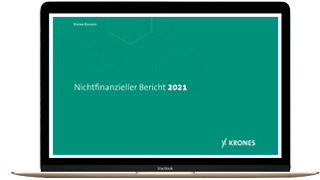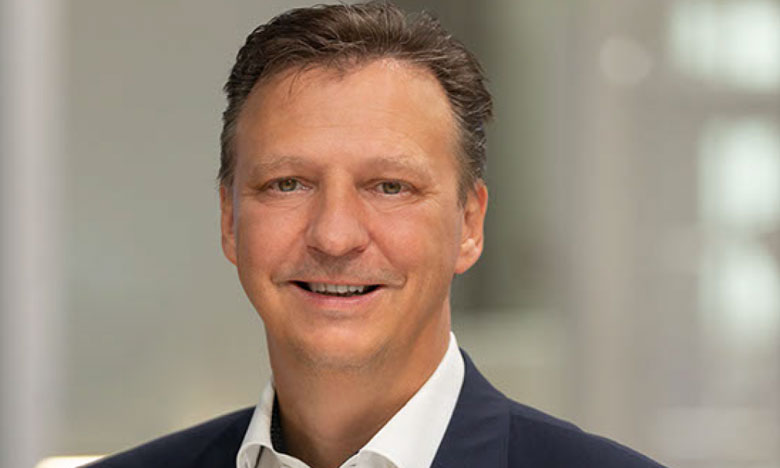Krones Group Annual Report 2021
Sustainable value creation is a central focus at Krones in order to make our -contribution to a future worth living. Our customers also attach great importance to sustainable production and products. Investors also increasingly base investment decisions on sustainability criteria. Krones’ sustainability targets, strategies and performance are of great importance to stakeholders.
Sustainability at Krones
Efficient and environment-friendly technologies for safe and high-quality -beverages: That is the mission in terms of sustainability that Krones has set itself as systems supplier to the food and beverage industry. Consumers are making sustainability part of their buying choices more than ever before, and so our customers depend on us to provide sustainable solutions for their production operations.
We focus on innovative solutions and efficient technologies. Accordingly, we work continuously to improve the efficiency, longevity and eco-friendliness of our products and services. We are also increasing the sustainability of our own operations and value creation processes. We firmly believe that a consistent approach to sustainability will help us leverage new opportunities for growth.
Two separate teams serve as Group-wide coordinating bodies to integrate sustainability in parallel into the development of our company and our products: All product-specific sustainability issues converge in Corporate Development, while all company-specific environmental, social and governance (ESG) aspects are centrally managed by Corporate Governance. The top-level Sustainability Steering Board addresses all sustainability matters arising from the entire Krones Group value chain. Here, representatives from the management of central units along the value chain (including procurement, research and development, and sales) consult on the strategic orientation in terms of sustainability and formulate suggestions and recommendations for the Executive Board.
In 2020, analogous to the material sustainability topics, Krones developed and adopted new goals for the company’s sustainable development through to 2030. Unless noted otherwise, the new goals use the year 2020 as a baseline and apply across the group. The goals are to be reviewed as needed based on new materiality analyses, legal and regulatory requirements and stakeholder interests.
The United Nations Sustainable Development Goals (SDGs) are considered the most important set of global targets for sustainable development. The 17 goals were published in September 2015 as part of the UN’s Agenda 2030. They articulate the key challenges and resolutions of a global sustainability policy and thus serve as a guide for the sustainable development of society, culture and the economy.
Because it is part of global value chains, the Krones Group also influences economic, environmental, and social developments – sometimes directly and materially and sometimes only indirectly and to a small extent. When assessing sustainability topics for materiality in 2019, we made the impact on SDGs a key factor. We held a stakeholder workshop with representatives from administration, trade associations, academia and our employees in which we discussed the global SDGs on which the Krones Group is already having an impact and which ones it will need to address in the future. The results of the workshop were part of our materiality analysis and have also been incorporated into our strategic planning of sustainability-related activities. Krones has an influence on the following UN SDGs:
We believe that we are stronger when we work together. Krones has been a member of the UN Global Compact since 2012. We collaborate with companies within our industry under a diverse range of sustainability-focused project groups of the German Engineering Federation (VDMA) and are an official partner to the VDMA’s Blue Competence Sustainability Initiative.
Our climate strategy 2030 has been officially validated by the Science Based Targets initiative. In the 2021 financial year, we additionally joined Business Ambition for 1.5 °C.
We ensure transparency towards customers, investors, and analysts by participating in recognised ratings and audits.
On the annual reassessment of our sustainability performance, we use feedback from rating agencies to fine-tune our structures, processes and activities. We thus improved our CDP Climate Change score from D in the previous year to C. Conversely, our rating on the EcoVadis Scorecard went down from gold to silver. It is clear to us that the realignment of our sustainability strategy in 2020 was an important further step towards sustainable development at Krones. Our ambition is to become the industry benchmark in terms of sustainability. We aim for this to be reflected in our ratings in future years.
Activities to reduce greenhouse gas emissions are of particular importance to the capital market. In addition to Scope 1 and Scope 2 emissions, analysts and investors are notably interested in how we reduce carbon emissions from our machinery and equipment (Scope 3 emissions) and so help customers shrink their carbon footprint. This is a decisive investment criterion for customers and hence also a key success factor for Krones. In the following, we therefore present information on the reduction of Krones’ carbon footprint.
|
Target We are reducing the Krones Group’s corporate carbon footprint by cutting Scope 1 and Scope 2 greenhouse gas emissions by 80% by 2030. With regard to the group’s Scope 3 emissions, we aim for a reduction of 25 percent by 2030, with a focus on shrinking our product carbon footprint. Both goals use 2019 as the base year. Above and beyond these goals, we aim to make our own business processes climate neutral in the long term. Scope 1 emissions are “direct” emissions generated by on-site combustion. They therefore include all greenhouse gas emissions resulting from the company’s own business activities. Scope 2 emissions are “indirect” energy-related emissions from the generation of energy purchased by the company for its own use. These greenhouse gas emissions are physically generated in electricity, steam and district heat generating plants operated by external energy producers. Scope 3 emissions are all other indirect emissions from the value chain and products. They include all other indirect greenhouse gas emissions from upstream and downstream business activities. |
As a company that emits greenhouse gases along its value chain, we have a responsibility to help combat climate change. To meet this responsibility, we set new climate targets in the 2020 financial year. These provided for significant reductions in both direct and indirect emissions by 2030. We set the -reductions to be achieved in each case in terms of absolute figures not tied to revenue.
The associated climate strategy covers all major production sites in the Krones Group worldwide and has been validated in an objective evaluation by the -Science Based Targets initiative.
Environmental and climate policy
To set strategic and organisational priorities in operational environmental and climate protection at Krones, we adopted and published a Group-wide environmental and climate policy at Krones in the 2021 financial year. We also specified environmental standards, focal topics and the associated targets, processes and responsibilities. The standards are to be applied in day-to-day production processes and projects, thus ensuring environmentally friendly operations at all producing sites and subsidiaries and contributing to continuous improvement in environmental protection.
Reduction of Scope 1 and Scope 2 emissions
For the reduction of direct and indirect energy-related greenhouse gas emissions, all measures have been assigned to the areas of energy efficiency, own generation and energy procurement.
The charts below show the development of greenhouse gas emissions at Krones.
Reducing Scope 3 emissions
Our analysis has shown that the majority of our Scope 3 emissions come from the downstream value chain. We therefore focus efforts to reduce Scope 3 emissions on improving our own products. Although we have achieved substantial and consistent results under the enviro programme, we do not want to leave the remaining potential for reduction untapped. You can read more about this under “Product sustainability” on page 17 to 23 of our Non-financial Report.
As of 2021, we are also placing an increasing focus on the upstream supply chain. In a database analysis based on monetary procurement figures, we have identified the biggest emission drivers in our supply chain. The next step is to derive suitable measures for reducing emissions here as well. We have already entered into discussions with an initial selection of suppliers in order to find an effective and practicable approach (for more information, please see und “Sustainable supply chain” on page 71 to 74 of the Non-financial Report).
 |
More information on the subject of sustainability at Krones can be found in our Non-financial Report. This is available online, which is published concurrently with this Annual Report. |
